- Home
- Charles L. Grant
The Tea Party - A Novel of Horror Page 6
The Tea Party - A Novel of Horror Read online
Page 6
Doug shook his head. Two days ago, Parrish had called to make an offer for his house. A client whose name he would not and could not reveal had an interest. And a great deal of money. He would pay cash, full price on signing, and more money than Doug hoped to see at one time in his life.
Eban Parrish was in real estate, and by all appearances he was doing very well.
“Mr. Parrish, to be truthful, I haven’t thought about it a great deal at all.”
“Ah. Well, I’m sorry to hear that.”
“No, you don’t understand. I haven’t thought about it because I don’t want to sell.”
He heard the bubbling again and wondered if the curious old man were under treatment for something.
“I see.”
“I’m flattered, of course, that someone likes this old place so much but . . . well, let’s face it, Mr. Parrish, I’ve a lot more than money invested in it now.”
“I understand perfectly.”
“I just hope your client will understand.”
“Oh, I am sure of that, Mr. Muir. Absolutely. And by the way, I think you should know I have been in close contact with a gentleman from Florida who is interested in purchasing the Winterrest estate.”
Doug waited, saying nothing.
“He has, if I may say so, some extraordinary plans for establishing a condominium resort there.”
“What?” He sat up abruptly. “You’re kidding.”
“I do not kid, Mr. Muir, in matters of business.”
Before he could respond, the man had rung off, and he was left staring at the mouthpiece.
God, he thought, and hung up. He was about to leave when he remembered something that had caught his momentary interest in the study. Something about Parrish. He frowned, looked into the darkened room, and saw himself leafing though some old magazines. Pictures of homes, pictures of designs . . . a picture of a man who vaguely resembled Parrish.
He scoffed. It couldn’t have been, and now his nerves were telling him lies, making him recall things that weren’t so.
Christ. Lights in Winterrest, winds out of nowhere, and Eban Parrish on the phone shilling for invisible men. M’boy, he thought, you need a drink. Fast.
The bronze-painted, canvas-top Jeep was a godsend, he thought, if not a miracle. It managed to get him up the road and around the skirt of the steep rocky hill to the unpaved flat a half-mile from the county highway without once losing control and skidding into the trees—something he had done too often after he’d first purchased the vehicle. The road was canted downward to the right, and he was constantly fighting to keep from sliding off the seat while, at the same time, maneuvering the Jeep straight ahead. In winter it was hell with the road sheeted in ice, and he seldom left the house; the rest of the year it was only a pain in the ass.
On the other hand, the road’s deplorable condition prevented unexpected visitors, salesmen or otherwise. And few of the local people he knew wanted or dared to trust their axles to a genuine deathtrap.
Once on the flat, however, he relaxed and sped up, noting absently the half-dozen ramshackle dwellings he passed on the way. He knew by name all the families living there, but only one—Piper Cleary and his incessantly fighting brood—had any specific dealings with him, which was fine with him and evidently perfect for them. Most of the houses, no matter how large, seemed to have been cobbled together with spit, hasty prayers, and ten rolls of tarpaper; if there wasn’t a rusting truck or car in the front yard, there were plenty of scratching chickens, angry geese, and the occasional grazing goat or two.
If the people saw him, they waved politely enough, but no one made a special trip to the front door when they heard him coming; not even Cleary, unless he was looking for work.
A hound bayed; a hawk coasted.
The temperature began to slide as the sun began to drop.
Fifteen minutes later he reached the unmarked T-intersection with the county road and was about to swing left and head for Deerford when he recalled Judy’s whispered comment about Casey seeing lights in Winterrest. It was probably nothing. Casey was not known for his sober observations. Still, now that he knew from Parrish what was in the estate’s future, there might be something to it after all. He looked right, shifted gears, and pulled out onto the tarmac, drove for another mile between a high wall of evergreens before slowing, pulling onto the verge, and stopping.
There was nothing special about Winterrest except that it was there—in the middle of nowhere, an out-of-place mansion on a meadow unmarked by a single tree.
Driving toward Pennsylvania, the passing tourist saw only a three-foot greystone wall three hundred yards long which, by assumption, enclosed the estate. In its center was a simple wood-slat gate that opened onto a narrow graveled drive leading directly to the house one hundred yards back. There were no trees lining it, no shrubs or ornamental fountains. Only grass. Acres of it, seemingly miles of it, reaching out to the flanking hill.
The house was two stories high, of large greystone blocks, its windows placed one above the other, narrow and arched, evenly spaced on both sides of a tall wooden door. There was no porch, just three steps to the threshold. Above the highest windows were gables that broke up the steep pitch of the black slate roof. He could count eight chimney stacks, none of which he had ever seen smoking.
Casey said there was a light.
Parrish had said someone wanted to build condominiums there.
He left the Jeep and ambled over to the gate, leaned on it, and stared, but could see nothing through the distorted reflection of the lawn in the windows. There was no other building on the grounds, no garage or servants’ cottage, and he could see no cars parked anywhere near the front. An angled glance to his right and he could see the heavy stand of oak that marked the division between this land and his own.
Back to the house, then, and he smiled. He loved the place, had spent hours walking around it in covetous wonderment. The stones had been blocked, set in place and trimmed, and as far as he could tell not a single speck of mortar had been used to hold it together. The construction was flawless, a superb job that left no seams, no cracks; a job that few, if any, could do anymore, and he would kill for the chance to build just such a house.
His envy for the unknown master craftsman was enough to make him want to turn in his pencils, burn the drafting board, and raise horses instead of blueprints.
He moved along the waist-high wall a few paces, put his hands on the top, and had another look around, thinking that the local high school kids must be making a fortune mowing all that grass.
Suddenly, he snapped his hands back and gaped at the stone.
The wall had moved.
He could have sworn it had moved.
It was cold on first contact, rough and gritty. Then, without warning, it had rippled as if it had turned to water, shifted as if ready to make room for his hand.
It had moved.
The stone had moved.
He stepped back, reached out, and poked a finger at one of the blocks. Cold again; hard. He looked around, expecting a prankster to be watching him and laughing. He pushed; it didn’t give. He frowned and moved closer, lay his palms on the top and leaned on them, hard. The wall didn’t move, didn’t give, and he returned to the Jeep with a shake of his head, slid in behind the wheel, and looked at the house again.
Though the estate was carefully maintained, it was obviously deserted. Despite the odd feeling he’d just had at the wall, there was no sense of habitation, of menace, of decay. It just was, nothing more.
Casey, he thought, you must have been drunk.
But the wall had moved.
God damn, it had moved.
Quickly, he swung the Jeep into a U-turn without bothering to check for traffic and sped down the road, passed Hollow Lane and raced south toward the overhanging traffic light he could see in the distance.
“You’re nuts,” he muttered as he wiped a hand across his chest. “Nuts, like old Sitter.”
3
And he waved.
At every car, van, truck, that passed him he shot out his arm and hand in a stiff-elbow wave.
And he smiled.
At every driver, every passenger, no matter how startled.
Most of the tourists and those just passing through were too astounded to respond, or they ignored him as a nut; the locals, however, and a handful of others, waved back enthusiastically, especially the children, and odd as it may seem he made them all feel good.
On Friday then, in July, he sat in his customary place and waited, but he wasn’t smiling, he wasn’t still. He squirmed, and he kept looking north, up the road toward Winterrest, noticing but paying little attention to the Jeep heading his way. There was something odd about the day, and he wondered if anyone else felt it—the change in the weather, the change in the town.
Sitter wasn’t surprised, though. He was nearing sixty come November, and it was something like fifty years ago when he last felt the change. He didn’t know what it was then, and his folks dead and buried twenty years had never said a word. But it was there, and when he woke up last Monday morning he remembered it as if it had happened only the day before.
The only trouble was, he couldn’t remember what the change meant. If it was a change. If it meant anything at all.
On the other hand, Mr. Parrish didn’t pay him to think about things like that. He was paid to sit, and to watch, and to count the people leaving, count the people coming in; the waving was his own innovation—because he liked to make people happy.
He shifted again, and scratched hard at his beard. It would be a while before the next car came by—people from the Meadow View development just east of the light coming home from work. Some of them even waved before he did because their entrance was a good fifty yards away. Some didn’t like him, though, and that hurt. He wasn’t bad, not as bad as some and maybe even better than others. His house was clean, he washed and combed his hair and beard every morning, and he never bothered anyone at all. Never. Ever. In fact, as far as he could remember, he hadn’t spoken more than a couple of sentences at a time to anyone since Pop and Mom died.
Except for Piper Cleary.
And except, of course, for Mr. Parrish.
And he didn’t mind not talking, either. Mr. Parrish paid him well just to stay where he was, and since he couldn’t do anything else, he wouldn’t want to lose his job.
A job where all he had to do was count, and make people happy.
4
As soon as Doug made the turn onto Deerford Road he relaxed, slowed down, slumped back in his seat, and shook his head. His laugh was explosive and short, and he startled himself so much he nearly drove off the road. But leave it to old Sitter to make him feel better, chase away the willies, keep the clouds from his sun; and not for the first time he promised himself that someday he was going to stop and ask the man why he did it. But that, he knew, would undoubtedly spoil the effect. If the guy was drunk all the time, or stoned, or just plain off his rocker, waving to him would never be the same again.
Just like a lot of things weren’t the same anymore— his fear of loving (you killed him), his slow-moving work (it was an accident), even the dreams that continued to haunt him while he was awake (but you killed him you killed him).
“Yes,” he whispered.
murderer
“No. Damnit, no!”
His grip on the steering wheel became a stranglehold, and he closed his eyes briefly, holding his breath until he was able to see in his mind’s eye not the shattered window and the ugly hate on Ellen’s face, but Sitter, in his lawn chair, waving and grinning and no strings attached.
Thanks again, pal, he thought with a glance to the rear view mirror. Thanks. I owe you.
Five minutes later he swung into the Depot Tavern’s narrow, graveled parking lot and braked alongside the single-story building. It looked very much like three freight cars placed one behind the other—and it was. When the DL&W was selling off a portion of its rolling stock to all comers back in the late twenties, an enterprising young innkeeper from just outside town thought they would make an unusual and profitable attraction. Damning the expense and the jeers of his neighbors, he had them hauled all the way from Newark, settled their massive iron wheels on a specially made reinforced foundation, then knocked out the interior walls to make room for the bar, booths and tables, and a kitchen that served only slightly less greasy food than the grill it was cooked on.
The man went broke a year later, and Judith Lock-hart bought it at a sheriff’s auction. Now it was painted a garish, fire engine red, the windows were outlined in white, and the chimney pots were a dingy grey. It had been redone only that spring, with the help of half the town and the Mohawk Gang, a group of kids determined to raise hell and be saints, both at the same time. Despite the dust born of the heat wave that wouldn’t quit, the paint still gleamed, reflecting streetlight and starlight like the memory of an old ballroom.
Tonight, however, it looked too much like blood.
Doug paused as the door hissed shut behind him. Seattle was long gone, along with the moving wall, the wind, and Eban Parrish’s call. Now there was noise. People noise, drinking noise, and he was glad for a change that Casey had gotten drunk.
The slightly curved bar was thirty feet long and cut from white pine logged from the nearby hills; the nine round tables between it and the twelve booths at the front were filling slowly, mostly with men and women in for a quick easy meal before heading off to a movie, the drive-in in Newton, or the shopping malls at Port Jervis. A few of them raised hands and voices in boisterous greeting when he walked in, and he smiled and nodded back, heading directly for the bar, where he pulled a starched apron down from a peg and slipped right into the ordering rhythm without turning a hair.
Judith was tending the register, and when she looked around and saw him, she allowed him a harried grin and a wink. She was his age, perhaps a year or two older, with curly black hair and a plump pale face touched with dark freckles. She moved quickly without seeming to, small hands darting, red lips moving. Her red shirt with sleeves rolled to the elbows, and black slacks covered by a red checkered apron, were neither too snug for her slight figure nor so loose that she fooled the males into thinking she was a boy.
She was attractive without being intimidating, and more than one man, after seeing her, was reminded with a bittersweet pang of a high school sweetheart he had never seen again after sharing that last, graduation night kiss.
When she had a moment, she hurried over to him, got up on her toes and kissed his cheek.
“You’re a lifesaver.”
He nodded and saluted. “Yep. Sergeant Muir of the Yukon, with his trusty Jeep, King. Where’s Casey?”
She slapped angrily at the bartop with a towel, scooped up a tip and dropped it into a empty coffee can next to the rinsing sink. “I don’t know. I don’t care. I hope he falls in a goddamned well.”
“Not very familial.”
“If my father were alive today, he’d shit a brick if he saw what his son was doing.”
“Your father, by all you’ve told me, hated his guts.”
“He’s over there in the corner, by the TV.”
“Who? Your father?”
Exasperation made her scowl. “No, idiot. Casey. He came in about five minutes ago. And if y
ou want to keep your scalp, don’t you dare sell him a drink.”
He laughed softly and squeezed her hand, then deftly filled several orders and passed quips with Piper Cleary about the state of his beloved coon hound, Dumpling.
The wind still bothered him, and his knuckles still stung.
“What about the light your brother saw?” he said to Judy as he nodded to one of the waitresses picking up her tray. “Was he drunk or what?”
“I don’t know. Maybe somebody’s moved in.”
“I don’t think so.”
“Then he was drunk.”
He leaned closer, barely moving his lips. “Parrish called me just before I came over. He said there was someone ready to buy the place, land and all, and turn it into some kind of leisure resort. You know, condominiums and like that.”
Judy tilted her head, and looked at him sideways. “You’re kidding, right?”
“That’s exactly what I said to Parrish. He said, very indignantly, that he wasn’t.”
“Jesus. Well . . . Jesus!” She plucked at her hair and glared at the register. “Well, we can’t let it happen, you know that, right? I mean, we just can’t. God, you mean Casey was actually . . . we’ll just have . . .” Someone called her name and she nodded. “We’ll talk about it later.”
“Sure,” he said, wondering how he could bring up the afternoon wind and not sound like a fool. “Okay.”
She put a hand on one hip and set her back to the bar. “Doug, what’s bothering you?”
He gave her a painfully false smile. “It’s nothing,” he insisted. “I’m still . . . I guess I’m still back there at the old drawing board.”
It was obvious she didn’t believe him, and didn’t know the right question to ask; the trouble was, he didn’t know the right question either.
“Later,” she said.
“Right.”
People came, people left, and it was close to nine o’clock before lank and mustached Gil Clay, the night bartender, arrived with apologies for being late, and Doug was able to lean back and watch the crowd.

![[Oxrun Station] The Orchard Read online](http://i1.bookreadfree.com/i/03/17/oxrun_station_the_orchard_preview.jpg) [Oxrun Station] The Orchard
[Oxrun Station] The Orchard![Riders in the Sky - [Millennium Quartet 04] Read online](http://i1.bookreadfree.com/i/03/20/riders_in_the_sky_-_millennium_quartet_04_preview.jpg) Riders in the Sky - [Millennium Quartet 04]
Riders in the Sky - [Millennium Quartet 04]![Chariot - [Millennium Quartet 03] Read online](http://i1.bookreadfree.com/i/03/19/chariot_-_millennium_quartet_03_preview.jpg) Chariot - [Millennium Quartet 03]
Chariot - [Millennium Quartet 03]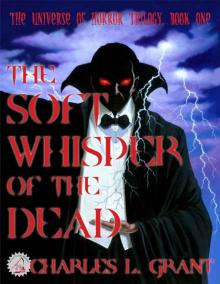 The Universe of Horror Volume 1: The Soft Whisper of the Dead (Neccon Classic Horror)
The Universe of Horror Volume 1: The Soft Whisper of the Dead (Neccon Classic Horror)![[Oxrun Station] Dialing The Wind Read online](http://i1.bookreadfree.com/i/03/19/oxrun_station_dialing_the_wind_preview.jpg) [Oxrun Station] Dialing The Wind
[Oxrun Station] Dialing The Wind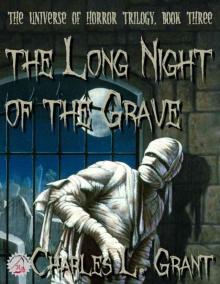 The Universe of Horror Volume 3: The Long Night of the Grave (Neccon Classic Horror)
The Universe of Horror Volume 3: The Long Night of the Grave (Neccon Classic Horror)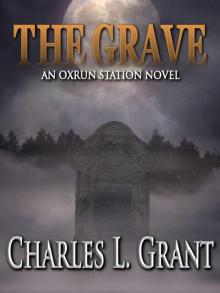 The Grave - An Oxrun Station Novel (Oxrun Station Novels)
The Grave - An Oxrun Station Novel (Oxrun Station Novels)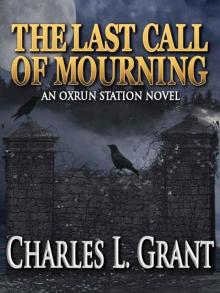 The Last Call of Mourning - An Oxrun Station Novel (Oxrun Station Novels)
The Last Call of Mourning - An Oxrun Station Novel (Oxrun Station Novels)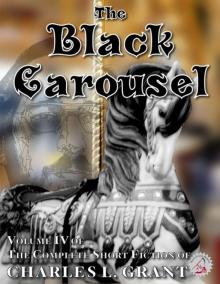 The Complete Short Fiction of Charles L. Grant, Volume IV: The Black Carousel
The Complete Short Fiction of Charles L. Grant, Volume IV: The Black Carousel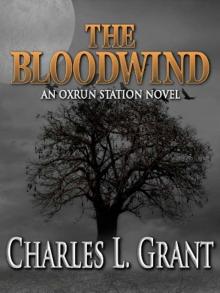 The Bloodwind - An Oxrun Station Novel (Oxrun Station Novels)
The Bloodwind - An Oxrun Station Novel (Oxrun Station Novels)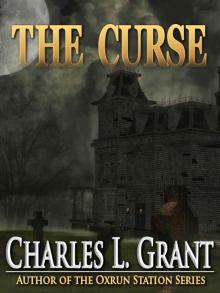 The Curse
The Curse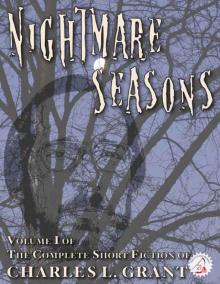 The Complete Short Fiction of Charles L. Grant Volume 1: Nightmare Seasons (Necon Classic Horror)
The Complete Short Fiction of Charles L. Grant Volume 1: Nightmare Seasons (Necon Classic Horror)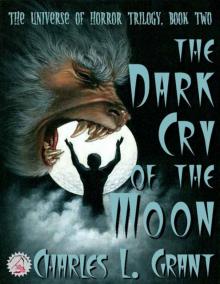 The Universe of Horror Volume 2: The Dark Cry of the Moon (Neccon Classic Horror)
The Universe of Horror Volume 2: The Dark Cry of the Moon (Neccon Classic Horror)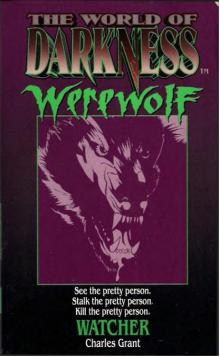 Watcher: Based on the Apocalypse (World of Darkness : Werewolf)
Watcher: Based on the Apocalypse (World of Darkness : Werewolf)![[Oxrun Station] The Bloodwind Read online](http://i1.bookreadfree.com/i/03/25/oxrun_station_the_bloodwind_preview.jpg) [Oxrun Station] The Bloodwind
[Oxrun Station] The Bloodwind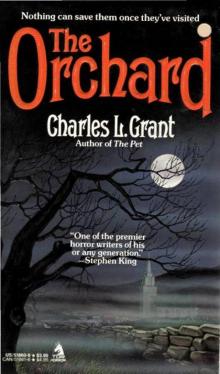 The Orchard
The Orchard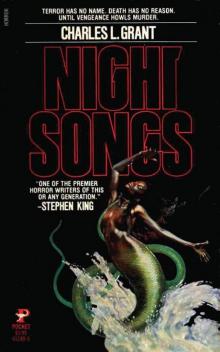 Night Songs
Night Songs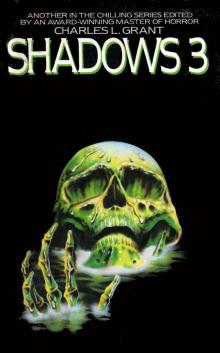 Shadows 3
Shadows 3![Symphony - [Millennium Quartet 01] Read online](http://i1.bookreadfree.com/i1/04/02/symphony_-_millennium_quartet_01_preview.jpg) Symphony - [Millennium Quartet 01]
Symphony - [Millennium Quartet 01] The Hour of the Oxrun Dead (Necon Classic Horror)
The Hour of the Oxrun Dead (Necon Classic Horror)![In the Mood - [Millennium Quartet 02] Read online](http://i1.bookreadfree.com/i1/03/31/in_the_mood_-_millennium_quartet_02_preview.jpg) In the Mood - [Millennium Quartet 02]
In the Mood - [Millennium Quartet 02]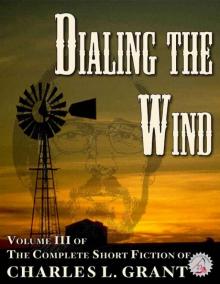 The Complete Short Fiction of Charles L. Grant Volume 3: Dialing the Wind (Neccon Classic Horror)
The Complete Short Fiction of Charles L. Grant Volume 3: Dialing the Wind (Neccon Classic Horror)![[Oxrun Station] The Last Call of Mourning Read online](http://i1.bookreadfree.com/i2/04/05/oxrun_station_the_last_call_of_mourning_preview.jpg) [Oxrun Station] The Last Call of Mourning
[Oxrun Station] The Last Call of Mourning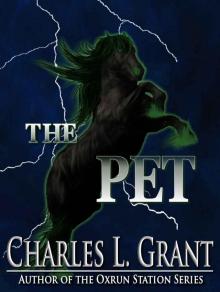 The Pet
The Pet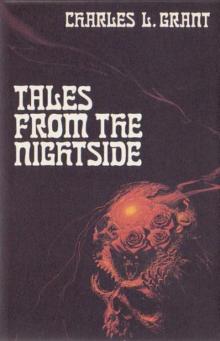 Tales from the Nightside
Tales from the Nightside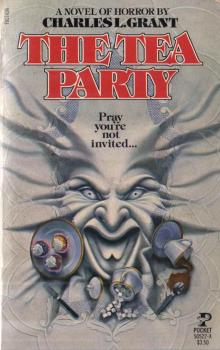 The Tea Party - A Novel of Horror
The Tea Party - A Novel of Horror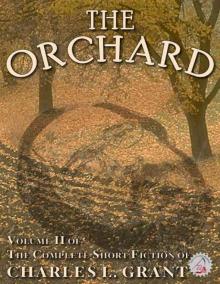 The Complete Short Fiction of Charles L. Grant Volume 2: The Orchard (Necon Classic Horror)
The Complete Short Fiction of Charles L. Grant Volume 2: The Orchard (Necon Classic Horror) Whirlwind
Whirlwind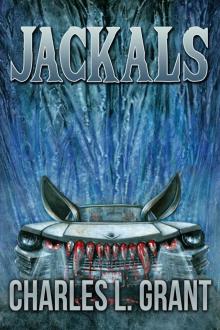 Jackals
Jackals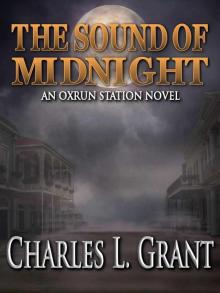 The Sound of Midnight - An Oxrun Station Novel
The Sound of Midnight - An Oxrun Station Novel